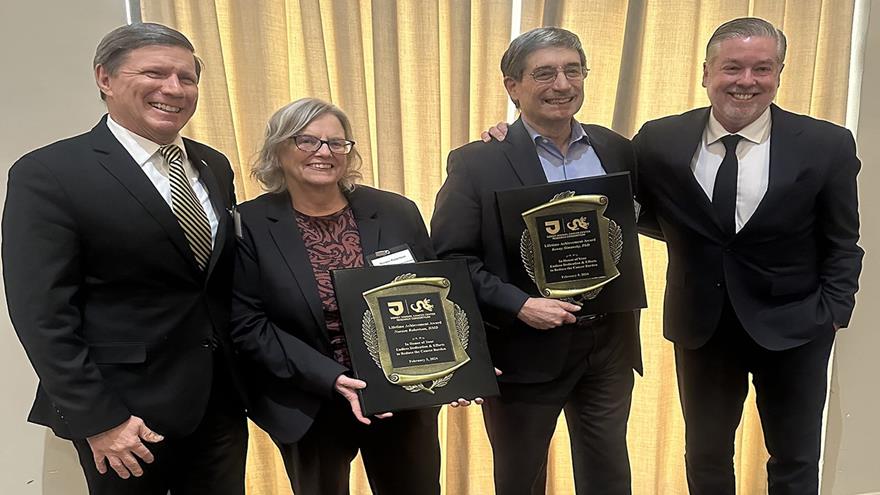Science Centers QED Program Awards Grants to Drexel Biomed Professors
October 21, 2009
Related

- Bolstered by Research Consortium with Drexel, Jefferson’s Sidney Kimmel Cancer Center Earns NCI Comprehensive Cancer Center Designation
- No link between acetaminophen use during pregnancy and children's autism risk
- Drexel Recognizes Gregory E. Deavens, CPA, CGMA as Business Leader of the Year
- $15 Million Gift from Howley Foundation Expands Drexel Scholarship Program for Local Graduates
A new regional Proof-of-Concept program is pumping $600,000 into technology commercialization in the Greater Philadelphia region. The University City Science Center’s QED Program awarded three researchers at Drexel University and the University of Pennsylvania a total of $600,000 to pursue commercially-relevant R&D related to life science technologies. The “winning” researchers will each receive $100,000 from the Science Center, a $100,000 match from their supporting institution, and business advice for one year. The QED Program, the first multi-institutional proof-of-concept program for life science technologies, bridges the “valley of death” -- the gap between research grants and commercial seed investment, by awarding grants to life science technologies with high potential in the healthcare industry. The three awards are the first of the QED Program. The three funded technologies are: --A portable, low-cost, radiation-free breast cancer screening device for use in women with dense breasts, being developed by a team led by Dr. Wan Shih of Drexel University. The proposed device could be used as an adjunct to mammography (particularly for women under 40), or for use in countries where mammography is not readily available.--Nanostructured thin films for reducing bacterial infection via external bone fixator pins, being developed by Dr. Paul Ducheyne’s team of the University of Pennsylvania. If successful, these films would reduce the currently high complication rates that are observed when compound fractures are repaired using external fixation.--A handheld wound-healing monitor, being developed by Dr. Elisabeth Papazoglou and her team at Drexel University. This device would provide an objective method for healthcare professionals to assess healing in complex wounds, such as diabetic ulcers, helping to reduce costs and avoid dire sequels such as amputation.“We cannot afford to wait for the economic crisis to end before funding scientific research projects with commercial potential. Innovation doesn’t stop when the market is down; commercialization must continue as well,” said Stephen S. Tang, Ph.D., President and CEO of the University City Science Center. “The QED Program helps by focusing existing regional resources on early-stage life science R&D projects in order to better accommodate upfront business risk and attract follow-on investment.” “BioAdvance and the region are excited to have the QED program make its first awards,” said Barbara S. Schilberg, CEO and Managing Director, BioAdvance. “QED serves an important role in the capital continuum in Greater Philadelphia, by highlighting new technologies and providing critical capital to help move these early innovations to the next stage of funding.” BioAdvance participated on the selection team for these awards. “The ability for a region to put in place a continuum of funding and support for technology development and commercialization is an indicator of the strength of its innovative capacity. The QED Program fills a gap in the resources needed to grow new technologies in Greater Philadelphia,” said RoseAnn B. Rosenthal, President & CEO of the Ben Franklin Technology Partners of Southeastern Pennsylvania (BFTP of SEP). BFTP of SEP also served on the selection committee. The QED Program began in April 2009, when an RFP that was sent to 10 universities and research institutions in Pennsylvania, New Jersey and Delaware generated 73 responses. A team comprised of regional industry representatives and investors reviewed the white papers and narrowed the proposals down to 10 projects in June. The 10 applying scientists were paired with business advisors and spent the summer developing both the research projects and a business case to support them. In October, the researchers presented to the selection team, which ultimately selected three projects.“The QED review process provides a rigorous review for both clinical relevance and commercial potential for research programs that are entering their translational stage,” said Simon Archibald of Integra Life Sciences, who served on the selection team. “Whether or not a project is accepted for funding, being part of the program should be of immense benefit to all participants." The QED Program (from the Latin “Quod Erat Demonstrandum” – “that which is demonstrated”) integrates four elements that are critical to successfully and efficiently performing early-stage proof-of-concept technology assessments: grant funding, business advice, market drivers and guidance to exit.This is only the beginning. A second round of RFPs was released October 15 to the 10 first-round participants and an additional six institutions: Children’s Hospital of Philadelphia, Delaware State University, Drexel University, Fox Chase Cancer Center, Lankenau Institute for Medical Research, Lehigh University, Monell Chemical Senses Center, Philadelphia College of Osteopathic Medicine, Rutgers University, Temple University, Thomas Jefferson University, University of Delaware, University of Pennsylvania, University of the Sciences in Philadelphia, Widener University and The Wistar Institute. The RFP can be accessed at www.sciencecenter.org/qed-rfp. A third RFP will be released in April 2010. About the Science Center The University City Science Center accelerates technology commercialization, regional economic development, and the market availability of life-enhancing scientific breakthroughs by bringing together innovations, scientists, entrepreneurs, funding, laboratory facilities, and business services. Established in 1963 and headquartered in Philadelphia, PA, the Science Center was the first, and remains the largest, urban research park in the United States. Graduate organizations and current residents of the University City Science Center’s Port business incubators have created more than 15,000 jobs that remain in the Greater Philadelphia region today and contribute more than $9 billion to the regional economy annually. For more information about the Science Center, go to www.sciencecenter.org.### News Media Contacts: Jeanne Mell, University City Science Center, 215-966-6029 jmell@sciencecenter.org Niki Gianakaris, Drexel University News Bureau, 215-895-6741 or ngianakaris@drexel.edu
In This Article
Drexel News is produced by
University Marketing and Communications.
now.editor@drexel.edu
For story suggestions or to share feedback
now.webmaster@drexel.edu
For questions concerning the website, or to report a technical problem